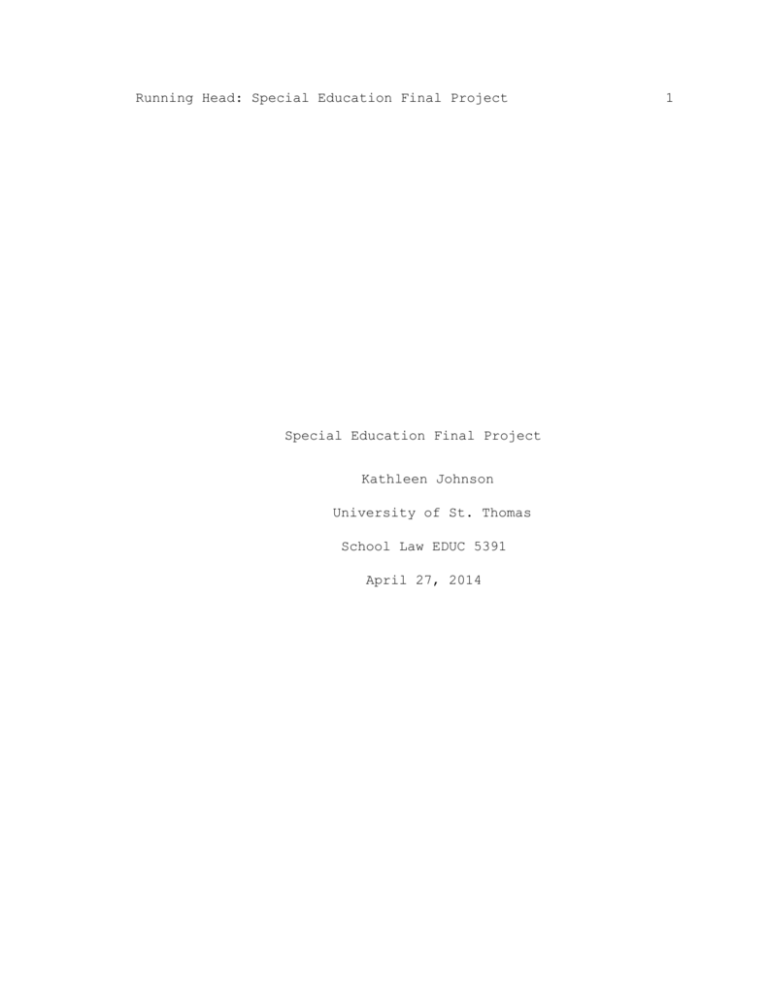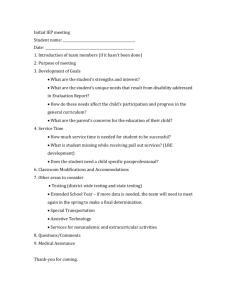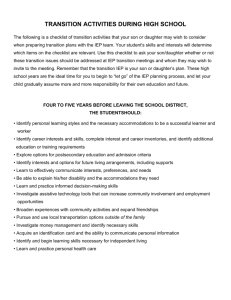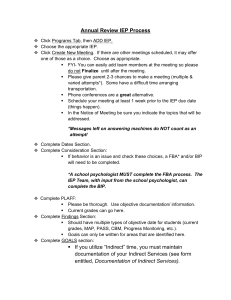File
advertisement

Running Head: Special Education Final Project Special Education Final Project Kathleen Johnson University of St. Thomas School Law EDUC 5391 April 27, 2014 1 Special Education Final Project 2 Introduction In the case Student v. Santa Fe Independent School District, the Petitioner (represented by the parent) requested Due Process pursuant to the Individuals with Disabilities Education Improvement Act (IDEIA). The Respondent is the Santa Fe Independent School District. The Petitioner filed the request on February 12, 2013. Neither party requested a continuance or extension of the Decision deadline. The hearing was held April 9-10, 2013, and the Decision was timely rendered and forwarded to the parties. Special Education Final Project 3 Part One The Hearing Officer decided upon the issues presented. The Petitioner alleges that the District failed to develop an appropriate IEP for the student on January 14, 2013, by removing necessary accommodations and that the proposed IEP denied the student a FAPE. The Hearing Officer's decision was that the IEP had been consistently carried out in a coordinated and collaborative manner by the key stakeholders. The Officer concluded that although IDEIA requires collaboration with the parent as a stakeholder in the student's education, the right to collaborate does not mean the right to dictate the method in which the teacher carries out instruction in the classroom. The way in which the accommodations are implemented is a matter of methodology, which is to be resolved by the District, not the Hearing Officer. The second issue is the Respondent filed a counterclaim, seeking a finding from the Hearing Officer that it did provide the student a FAPE during the 2012-2013 school year. The Officer's decision was that the parent who challenged the implementation of the IEP must show more than a de minimus failure to implement all elements of the IEP. The party must demonstrate that the District failed to implement substantial or significant portions of the IEP. Any failure on the part of the District to implement the student's accommodations perfectly was minimal which resulted in no loss of educational opportunity or denial of a FAPE. The Officer concluded that the SFISD provided the student with a FAPE at all times during the 2012-2013 school year and proposed that the IEP was reasonably calculated to continue to provide the student with a Free Appropriate Public Education. Special Education Final Project 4 Part Two Of the six major tenets of IDEA 2004, the case does encompasses IEP (Accommodations) and Free Appropriate Public Education (FAPE). All children with disabilities, regardless of type or severity of the disability, receive a free, appropriate education. An IEP must be developed and implemented to meet the unique needs of the student with a disability. The Individual Education Plan must specify the student's educational needs, the present level of performance, measurable annual goals and objectives, and describe special education and related services that will be provided to help the student attain those goals and benefit from education. The student's accommodations provided in the 2012-2013 IEP included close proximity to the teacher (front row of each class); extended time on exams of 150%; extended time up to 5 school days per assignment; contact the parent by email on the first day the assignment is not turned in; note taking assistance (slot notes); FM Unit to be made available in all classes; and ability to test in a quiet location (to reduce distractions). The ARD Committee decided that the accommodation of extended time for assignment completion will be reviewed at the end of the first semester adjusted to the student's progress. The parent and the District met on multiple occasions and communicated through multiple emails regarding the parents’ literal interpretation of the accommodations. They met to discuss accommodations of extended time on assignments; close proximity to the teacher (front row of each class); and note taking (slot notes). Special Education Final Project 5 The ARD Committee met on October 2, 2012, and clarified that front row seating is not available due to the class structure or activity. It was determined that written justification should be sent to the parent and the monitoring teacher. The parent insisted on the literal front row. The FM system was consistently made available to the student, but the student refused to use the device. The teachers provided note taking assistance in a variety of formats, but the student frequently refused to take notes provided by the teacher. The parent insisted that specific formats be used by the teachers but must be approved by her. These are a few accounts as to why the parent filed Due Process according to the IEP (Accommodations) thus claiming her child did not receive a FAPE. Part Three Based on the results of the Due Process Hearing, the implications for the school district for the future is to clarify "preferential to instruction" when discussing preferential seating as an accommodation. When it comes to terminology such as "slot notes", the district needs to clarify the definition not only for the parent but for all on the ARD Committee as well. This is to ensure no misinterpretations of the accommodations. As far as note taking, this involves methodology, which is an issue to be resolved by the District. Although the District failed to perfectly implement the student's accommodations, this failure resulted in no harm to the student. The District should produce a "good faith effort" when implementing IEPs. Special Education Final Project Part Four 6 Of all the numerous cases I reviewed for possible selection, this one I kept coming back to review. The case is intriguing because of the parent and the continued back and forth of complaints. It appeared that despite all efforts the District conveyed, the parent was never fully satisfied. The other reason why I selected this case was from the standpoint of a parent of a child with special needs. I can understand that she wanted to ensure all efforts to provide her child a FAPE and appropriate accommodations, but in my professional feelings I do believe the District made every reasonable effort in "good faith" to implement the IEP accommodations over the course of the school year. I wonder if this child is in high school thus being able to participate in the ARD. It appears the child was not in attendance at these meetings to determine their take on the accommodations and any concerns they may have in regards to the implementation. Professionally speaking, I would like to hear from the student and the reasons why they did not take advantage of their accommodations set forth in the IEP. Special Education Final Project 7 References http://www.tea.state.tx.us/Index2.aspx?id=6728 Essex, N. L. (Fifth Edition) School Law and the Public Schools





